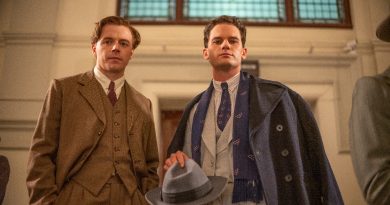The Death of Stalin (15) | Close-Up Film Review

Dir: Armando Iannucci, France/UK, 2017, 104 min
Cast: Steve Buscemi, Jason Isaacs, Jeffrey Tambor, Simon Russell Beale
Review by Carol Allen
With the creator of the biting political satire hit “The Thick of It” in the director’s chair and a high calibre, international, all star cast, expectations are high for this film version of the French graphic novel of the same name.
In the opening scenes it looks like those expectations are going to be realized, when radio producer Comrade Andryev (Paddy Considine), a radio producer putting out a concert, receives a phone call from Stalin himself demanding that the recording of the event be sent over to him pronto. But it hasn’t been recorded. In a state of blind panic and with visions of the gulag in his eyes Comrade Andyev locks in the orchestra, bribes the soloist, calls in another conductor, who shows up still in his dressing gown and hijacks an audience from the street in order to record the concert all over again. It is a blackly farcical sequence of the highest order.
Stalin himself is beautifully played by Adrian McLoughlin as a coarse but comic bully, with a chorus of pusillanimous, yes men acolytes hanging onto his every word. It’s almost a shame to lose him, when he is laid low by a stroke, which leaves him dying alone in a pool of his own urine because the guards are petrified to enter the room. When he is finally discovered, the acolytes dither. They can’t pronounce him dead, in case they get it wrong and then they will be for the chop and they can’t call a doctor because all the good ones have either been executed or imprisoned.
The substance of the film though is the aftermath of Stalin’s death, the two chaotic days of jockeying for position and succession – a dangerous game in a world where one day you may be top of the heap and the next day a dead man. Official successor is Malenkov (Tambor), a bumbling and ineffectual figure who hasn’t got a clue. He is inevitably going to be outmaneuvered by Buscemi playing Khrushchev as a calculating and sour tongued Mafia style figure. There is also Palin as party loyalist Molotov, who’d sell his own grandmother – he’s already denounced his wife – and Isaacs playing military hero Marshal Zhukov as a very plain speaking Yorkshireman with a fruit salad array of medals on his chest.
The one to strike fear into all of them though is Russell Beale as the creepily comic secret police chief. Beale, who has also played Stalin (onstage at the National Theatre in the play “Collaborators”), plays this master of murder and manipulation to the hilt.
All the above get their chance to shine – they are really good performances. There are also effective contributions from Andrea Riseborough as Stalin’s daughter Svetlana and Rupert Friend as his boozing son.
But the bulk of the film doesn’t really live up to the promise of those early scenes. The rapier of satire often becomes a bit blunt and the grim darkness of the farce sometimes sinks into a softer, sketch style comedy. It is still entertaining and there are plenty of laughs wrung out of the grimness of the situation and human cupidity but it doesn’t coalesce into a totally satisfying film. Maybe in order to satirise it, we need to experience the horrors of living under a totalitarian state for ourselves. It would be interesting for example to see what the Czechs, who have always had a talent for mordant satire, would do with the material.

